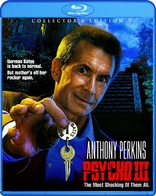Psycho III Blu-ray Movie
HomePsycho III Blu-ray Movie 
Collector's EditionShout Factory | 1986 | 93 min | Rated R | Sep 24, 2013
Movie rating
6.4 | / 10 |
Blu-ray rating
| Users | 3.6 | |
| Reviewer | 4.0 | |
| Overall | 3.6 |
Overview
Psycho III (1986)
One month after the events of PSYCHO II, Norman is still running the Bates Motel along with "Mother". Things are going fine until Norman falls in love with a fallen nun, takes in a greedy drifter, a nosy reporter sticks her nose where it doesn't belong and a series of murders begins once again.
Starring: Anthony Perkins, Diana Scarwid, Jeff Fahey, Roberta Maxwell, Hugh GillinDirector: Anthony Perkins
| Horror | Uncertain |
| Thriller | Uncertain |
| Mystery | Uncertain |
Specifications
Video
Video codec: MPEG-4 AVC
Video resolution: 1080p
Aspect ratio: 1.84:1
Original aspect ratio: 1.85:1
Audio
English: DTS-HD Master Audio 5.1 (48kHz, 24-bit)
English: DTS-HD Master Audio 2.0 (48kHz, 24-bit)
Subtitles
English
Discs
50GB Blu-ray Disc
Single disc (1 BD)
Packaging
Slipcover in original pressing
Playback
Region A (locked)
Review
Rating summary
| Movie | 3.5 | |
| Video | 4.0 | |
| Audio | 4.0 | |
| Extras | 4.0 | |
| Overall | 4.0 |
Psycho III Blu-ray Movie Review
Norman, is that you?
Reviewed by Jeffrey Kauffman August 24, 2013There’s hubris and then there’s hubris. It’s one thing to churn out a sequel to a relatively run of the mill effort that’s done well at the box office (consider the ever growing Fast and Furious franchise for an excellent example), but it’s something else entirely to attempt to craft a sequel (or two. . .or three. . .) for one of the most iconic and legendary movies in the entire history of film. And yet that’s exactly what happened with Psycho, Alfred Hitchcock’s still alarming 1960 opus which peered into the labyrinthine mind of one Norman Bates (Anthony Perkins). As I mentioned in the review of that film, younger audiences who have been raised on the slice and dice, hyperkinetically edited rash of slasher films that came in Psycho’s wake are often downright puzzled by Hitch’s rather languid pace in Psycho, where the justly lionized shower sequence doesn’t even take place until well past the 45 minute mark. Hitchcock obviously had more on his mind than mere titillating scares, and Psycho is an object lesson in how mood can permeate a film and deliver a much more chilling experience than mere shots of blood and guts spewing out all over the place. And so we come to Psycho II and Psycho III, two rather different sequels which appeared respectively in 1983 and 1986. Original Psycho author Robert Bloch had actually written his own sequel novel in 1982, but Universal went its own route in crafting the first sequel a year later (though there’s one rather odd link between Bloch’s follow-up and the second sequel, discussed in Psycho III’s review). Universal actually didn’t have huge hopes for the first sequel and originally planned for it to go straight to video and/or cable, but they were overwhelmed with public interest and press coverage, and ultimately agreed to release the film theatrically, where it did surprisingly well with both critics and at the box office. That of course only encouraged the bean counters at the studio, who quickly greenlit Psycho III, though in this case lightning didn’t strike twice, at least in terms of revenues. Critics still found a lot to like in the second sequel, but audiences had evidently had enough of Norman and Mother—at least for a little while (as the somewhat linked Psycho IV: The Beginning and Bates Motel prove). While the chiaroscuro shadow of the original Psycho looms fairly large over both of these properties, the good news is that both of them were made by people who obviously wanted to honor—at least in part—the spirit of Hitchcock’s masterpiece, and the results are generally much better than might be expected.
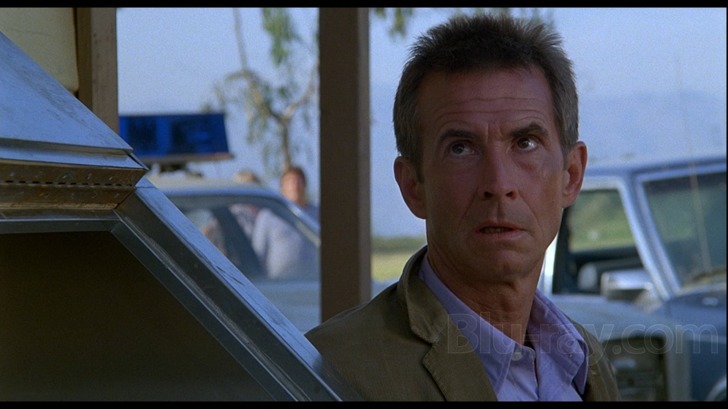
There is no God!
That hysterical, tragic shriek begins Psycho III on a properly desperate note (screenwriter Charles Edward Pogue credits Diana Scarwid for coming up with it herself). Psycho II had started with an actual clip from the first Psycho, but Psycho III instead gives a tip of the nun’s cowl to the finale of Vertigo, with troubled novice Maureen Coyle (Diana Scarwid) attempting suicide in much the same tower that Jimmy Stewart and Kim Novak made so memorable in the late fifties. While Maureen is kept from killing herself, a tragic accident does ensue, and Maureen leaves the convent, ultimately getting picked up by slimy musician Duane Duke (Jeff Fahey), who puts the moves on her in his car and leaves her stranded in the middle of nowhere when she rebuffs his advances.
This whole early emphasis on religious iconography (and characters) makes Psycho III much more overtly creed driven than the sometimes seeming subtextual references that dot Psycho II. Interestingly, Robert Bloch himself introduced nunnery in his own sequel novel to his original Psycho, though not in the same way it's depicted here.
Meanwhile back at the Bates Motel Norman (Anthony Perkins) has filled the motel’s dilapidated bird feeder—with poisoned pellets. A number of birds feast on the cuisine and then charmingly drop dead in the dusty parking lot of motel, where Norman picks them up and takes them back to the spooky Bates mansion in order to continue his taxidermy hobby. Through a series of various plot machinations, both Duane and Maureen end up at the Bates Motel, two purgatorial characters joining Norman in their own personal half lives before what seems like a sure ticket to hell. Duane takes on the job of Assistant Manager (viewers of Psycho II will know that that job remained vacant after an unfortunate calamity involving “Mother”), while Maureen moves in as a more or less permanent resident.
Norman had actually first noticed Maureen at the local diner, where she entered carrying a suitcase emblazoned with her initials “M.C.”, which perspicacious viewers will realize are the same as Norman’s (and/or Mother’s) most famous victim, Marion Crane (Janet Leigh). The film actually once again uses brief snippets from the iconic shower sequence to show that Norman has drawn an eerie parallel between this young blonde and another comely blonde from so very long ago. Will lightning (and/or a knife) strike twice? Roiling those murky swamp waters even further are the crusading efforts of a muckraking journalist (Roberta Maxwell), poking her nose into the disappearance of Mrs. Spool from the previous film.
In some ways Psycho III is less of a mystery than a character study, for there’s little question as to who is committing the mayhem this time around, an ambivalence that had actually provided much of Psycho II’s suspense. Pogue states in the commentary on this Blu-ray that while he felt the first sequel was “fine” (which sounds perhaps a bit grudging), he was less satisfied by some of the retooling of the original Psycho mythology, especially with regard to some late in the film revelations. His intent therefore was to set this Psycho back on a more authentically Hitchcockian path.
Unfortunately, what that means is repeated references to the first film, something that Perkins, who also directed, mines to variable effect. One of them, an outright seeming recreation, is brilliantly handled and in fact provides the film with yet more religious iconography. But there are also more glancing, and perhaps slightly less resonant, blows given toward the famous shower scene (two extremely confined spaces are exploited, one with a quick cut—no pun intended—montage obviously meant to ape Hitch’s approach), as well as, late in this film, a repeat of the equally impressive but somehow less celebrated stairway scene that featured Martin Balsam in the first film.
Psycho III works much better in some of the more original—and in some ways very darkly comic —ways that Pogue approaches the character of Norman, and Perkins both plays and films him. There’s an absolutely pitch perfect moment—a throwaway, really, but a definitive one—late in the film where Norman as Mother is on a rampage against yet another victim, but has enough presence of mind to straighten a crooked picture on the way. That’s comedy—and horror, all rolled into one. What could be more perfectly Hitchcockian?
Psycho III Blu-ray Movie, Video Quality 
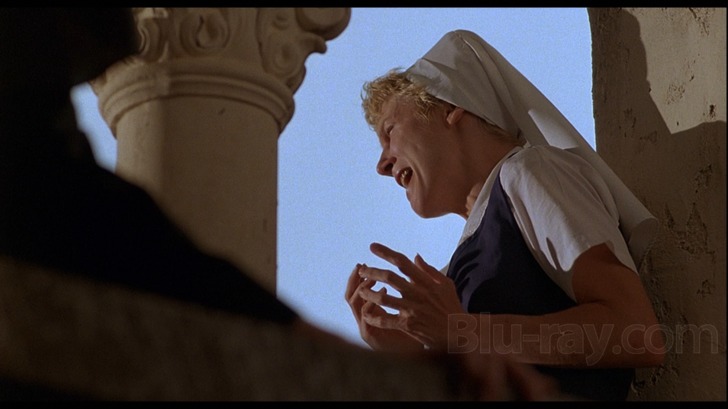
Psycho III is presented on Blu-ray courtesy of Shout! Factory with an AVC encoded 1080p transfer in 1.84:1. While this is almost as commendable a high definition presentation as Psycho II, there are a few minor issues which would make me subtract perhaps a quarter point from the video score were I able to. One of these is some very minor ringing which creeps into several scenes—you'll notice it for example in the opening sequence when Scarwid is in front of the large arched window, as well as later in the film when Perkins comes out of the house and walks toward the motel. While Psycho II's cinematographer Dean Cundey had earned the soubriquet Prince of Darkness, Psycho III's Bruce Surtees certainly works hard to be next in line, for a lot of this film is bathed in extremely low light, and this film even more than its predecessor is occasionally hobbled by middling shadow detail and crush. But on the whole, things look rather spry here, with the elements in great shape (as with the first sequel, some of the process photography is a little iffy looking), and perhaps even better color than Psycho II. Despite some minor issues (and they are relatively minor), Psycho III boasts a very natural look, with a healthy layer of fine grain, consistent contrast and a very stable image.
Psycho III Blu-ray Movie, Audio Quality 
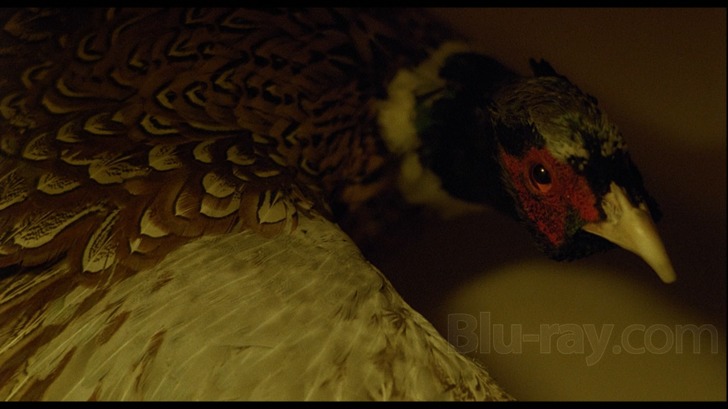
As with Psycho II, Psycho III features both a DTS-HD Master Audio 2.0 mix recreating the original sound design, and a repurposed DTS-HD Master Audio 5.1 surround mix. This film has a slightly more ambitious sound design than Psycho II, one which is helped marginally by the 5.1 mix, where foley effects are often utilized quite well to create a suffocating immersive quality. Fidelity is excellent in both of these tracks, with very well prioritized dialogue, effects and score (an early effort by Carter Burwell). Dynamic range is quite wide, especially in a couple of the hyperkinetic attack sequences.
Psycho III Blu-ray Movie, Special Features and Extras 
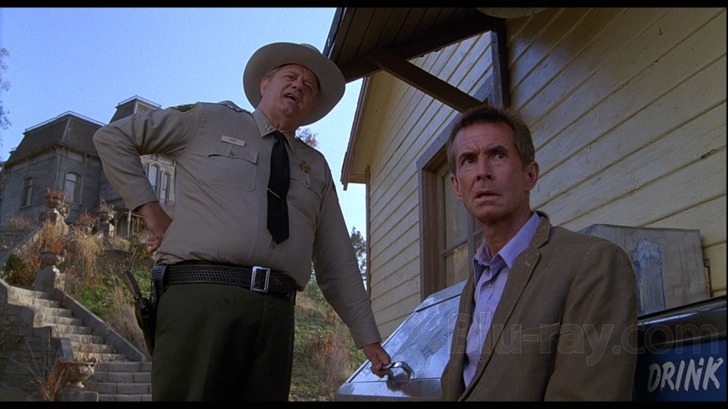
- Watch the Guitar: An Interview with Jeff Fahey (1080p; 16:49). Fahey has very strong memories of having made this film, as well as having watched the original Psycho as a kid. He talks a bit about what it's like to be an itinerant working actor, and how important this film was for his career.
- Patsy's Last Night: An Interview with Katt Shea (1080p; 8:40) talks about the casting process as well as what working with Anthony Perkins was like.
- Mother's Maker: An Interview with Special Make-Up Effects Creator Michael Westmore (1080p; 11:12). Westmore, yet another member of the iconic makeup clan, discusses his return to his old stomping grounds of Universal to help with the effects on the movie.
- Body Double with Brinke Stevens (1080p; 5:14). Stevens talks about her work as a body double on this film as well as other films like This is Spinal Tap.
- Trailers (1080p; 1:54)
- Still Gallery (1080p; 8:17)
- Audio Commentary with Charles Edward Pogue. Red Shirt Productions' Michael Felsher hosts this extremely enjoyable commentary with screenwriter Charles Edward Pogue. Pogue discusses how he got the job, as well as two different ideas he pitched to Universal (one featuring Janet Leigh as a therapist). This is a more anecdotal than technical commentary, but it's full of nice insight not only into this film in particular but some of the vagaries of the film industry in general.
Psycho III Blu-ray Movie, Overall Score and Recommendation 
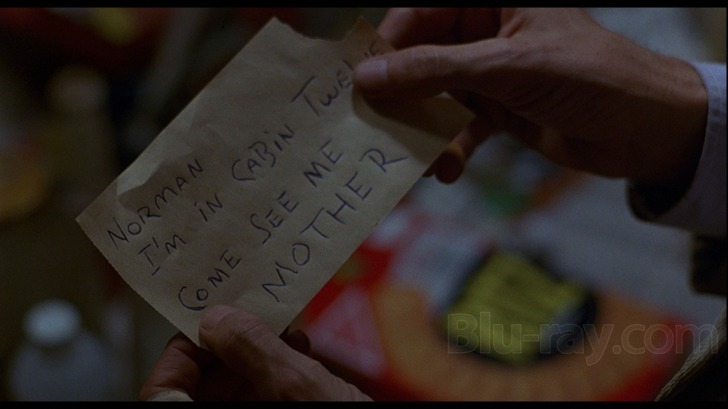
There's always been a law of diminishing returns with regard to repeated sequels of any property, and that somehow seems to only be magnified when the first film is of such legendary status as Psycho is. But Psycho III is much better than it really has any right to be, and that's due to some subversive comedy which keeps the proceedings both horrifying and funny simultaneously—something that harkens back to Hitchcock more authentically than any recreation of a set piece. Perkins and Scarwid are both excellent, and Fahey is both smarmy but oddly likable as Duane. This Blu-ray boasts nice video, audio and supplements and comes Recommended.
Similar titles
Similar titles you might also like

Psycho II
Collector's Edition
1983

Psycho IV: The Beginning
1990

My Bloody Valentine
Remastered
1981

The Prowler
Rosemary's Killer
1981

Halloween 4: The Return of Michael Myers 4K
Collector's Edition
1988

Scream
2022

Cherry Falls
2000

Edge of the Axe
Al filo del hacha
1988

Hands of the Ripper
1971

Deadly Blessing
Collector's Edition
1981

Thanksgiving
2023

Lovers Lane
1999

Halloween 4K
Collector's Edition
1978

Scream 4
Scre4m
2011

The Hearse
1980

Mortuary
2005

The Dead Are Alive
L'etrusco uccide ancora
1972

Halloween 4K
2018

Halloween Kills
Extended Cut
2021

Psycho 4K
1960
